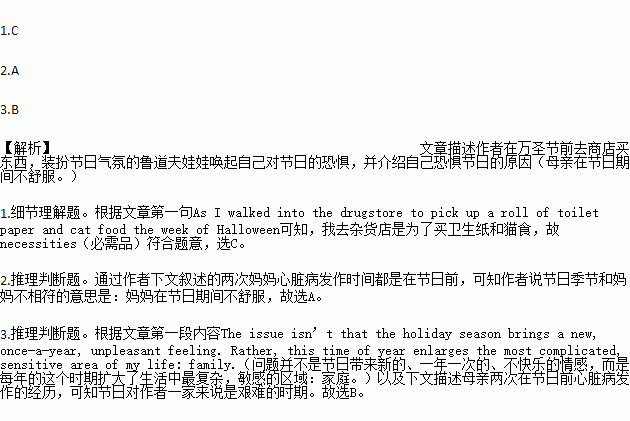题目内容
As I walked into the drugstore to pick up a roll of toilet paper and cat food the week of Halloween, I found myself being stared down by an oversized Rudolph doll. His eye expression aroused a swell of anxiety within me. This is not because I have an irrational fear of dolls. The red nose is a mocking reminder that for those of us who are members of dysfunctional(功能失调的) families, the most wonderful and challenging time of year is upon us. The issue isn’t that the holiday season brings a new, once-a-year, unpleasant feeling. Rather, this time of year enlarges the most complicated, sensitive area of my life: family.
Over the past several months, certain situations have left me emotionally raw when dealing with the subject of family, particularly my mom. The holiday season has never agreed well with her, physically or emotionally. Her first heart attack took place two weeks before Christmas when I was in the seventh grade. The song “Jingle Bell Rock” instantly took me back to driving to the hospital to visit her after her emergency heart operation. When I was at grade 2 at high school, we found ourselves awkwardly putting turkey into our mouths after my mom had come from a week-long stay in the hospital to recover from heart attack and a stroke. A girl of 15, due to the gift of having my mom alive and home to celebrate, my heart was contradictory that Thanksgiving.
1.The author went to the drugstore to ________.
A. buy some medicine B. buy a doll
C. buy some necessities D. see her family members
2.By saying the holiday season has never agreed with her, the author wanted to show ________.
A. her mother was not comfortable on holidays
B. her mother didn’t like holidays
C. her mother didn’t agree with her holiday plan
D. her mother often disagreed with her
3.What can be inferred about the author’s family?
A. Her family may be badly off.
B. Holidays may be hard times for them.
C. her mother was a strong-willed woman.
D. Her parents were not concerned about her.

